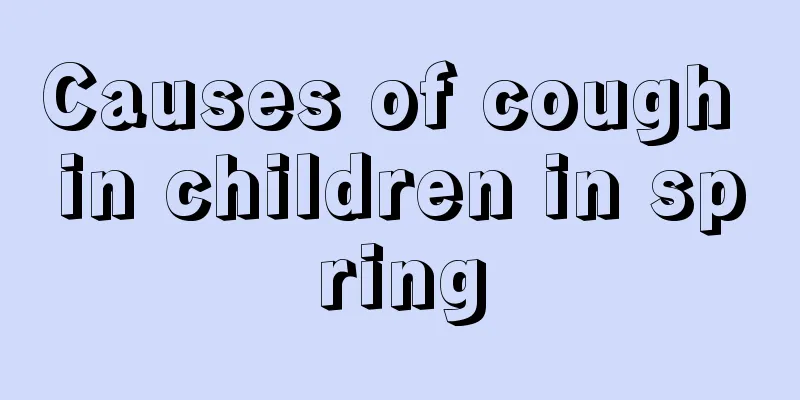What are the nursing methods for premature infant convulsions?

|
With the influence of adverse social factors, maternal factors and fetal problems, many pregnant women have premature births. This is also the reason why there are more premature babies. Premature babies will have many hazards and complications, which will affect their development. Premature baby convulsions are one of the most obvious hazards. After the symptoms are found, the disease must be well cared for and treated to control the development of the disease. So what are the nursing methods for premature baby convulsions? Keep warm Premature infants have difficulty regulating their body temperature, so the requirements for temperature and humidity in their care are very important. Clothing for premature babies should be light, soft, warm, simple and easy to wear. Diapers should also be soft and absorbent. All clothes should be tied with belts, and pins and buttons should be avoided. For those sleeping in an incubator, except for measuring body weight, nursing work should be done in the incubator as much as possible. Enter through the side door when operating, and open the lid only when absolutely necessary to avoid excessive temperature fluctuations in the box. Babies whose weight has increased to about 2,000g or more, are in generally good condition, maintain normal body temperature in an unheated incubator when the room temperature is maintained at 24°C, and who are fed with a bottle once every 3 hours and who suckle well and whose weight continues to increase, can be removed from the incubator. Proper feeding Because premature babies grow and develop faster, proper feeding is more important than for full-term babies. Time to start feeding after birth: Generally, premature babies can be fed sugar water 2 to 4 hours after birth. If there is no vomiting after 1 to 2 trial feedings, they can be fed milk after 6 to 8 hours. For patients who have experienced cyanosis, dyspnea, low body weight or who underwent surgery, 10% glucose solution can be given by intravenous drip at 60 ml/kg/d, or full intravenous and partial high-nutrient solution can be used, and oral administration can be switched after the condition improves. Feeding interval: It can be arranged according to different weights. Babies below 1000g can be fed once an hour, those weighing 1001-1500g can be fed once every 1.5 hours, those weighing 1,501-2,000g can be fed once every 2 hours, and those weighing 2001-2500g can be fed once every 3 hours. It can be extended appropriately at night. If you encounter a baby with insufficient intake, poor general condition, poor sucking ability, poor appetite and prone to vomiting, it is better to feed small amounts and multiple times during the day and night. Preventing infection The premature baby room should be equipped with air conditioning equipment to maintain constant temperature, humidity and fresh air. After birth, the baby should sleep on the right side to prevent inhalation of vomit. Change sleeping positions frequently to help lung circulation and prevent pneumonia. Generally, you can turn to the right after feeding, and to the left after changing diapers. When feeding with a bottle, it is best to hold the head, back or hold the baby with your left hand. After feeding, pat the baby's back gently to help him breathe out and then lie on his side. Children who are prone to vomiting can sit in a semi-lying position for a while to prevent milk from being inhaled into the respiratory tract or flowing into the external auditory canal after vomiting and causing infection. Once infection is detected, the child should be isolated. Care for convulsions in premature infants is very important. Premature infants will face many dangers, and the disease must be treated well, otherwise the life of the premature infant will be affected. When treating the disease, disease care must be done well. Care includes keeping warm and feeding, and paying attention to the occurrence of complications. After the premature infant's body recovers to normal symptoms, he or she can be discharged from the hospital. In the future, he or she should have regular physical examinations and pay attention to disease prevention. |
<<: How to regulate the stomach of a three-month-old baby?
>>: What are the main symptoms of neonatal cerebral palsy?
Recommend
Correct way to brush teeth for children
Teeth are the organs we use to chew food and play...
What are the symptoms of excessive formaldehyde in children?
The problem of formaldehyde exceeding the standar...
How to improve primary school students' memory
For primary school students, the memory of primar...
Causes and treatment of children's teeth grinding at night
Many young parents will find that their babies gr...
First aid for foreign bodies in children's trachea
Children are naughty by nature, and when they are...
What should I do if a girl has freckles on her face?
Children have very good skin on their faces, whic...
What are the sleeping positions for babies?
Newborns spend most of their time sleeping after ...
What are the symptoms of a broken foot in a child?
Children are naturally very naughty, so they are ...
6-year-old teeth have not fallen out and new teeth have grown
During childhood, we need to replace our teeth. T...
What to do if your baby has eczema on his back
How important are babies in people’s minds nowada...
What should I do if my child has a fever and is sleepy?
Nowadays, young children and the elderly are a hi...
How to deal with oral burns in infants
Babies are very young and must be taken good care...
How teenagers can protect their teeth
The importance of teeth is self-evident. To ensur...
Newborns fart a lot but don't poop
If a newborn baby farts a lot and has no bowel mo...
Children have yellow eye mucus due to inflammation of the eyes
Many parents feel that children’s problems are ne...









